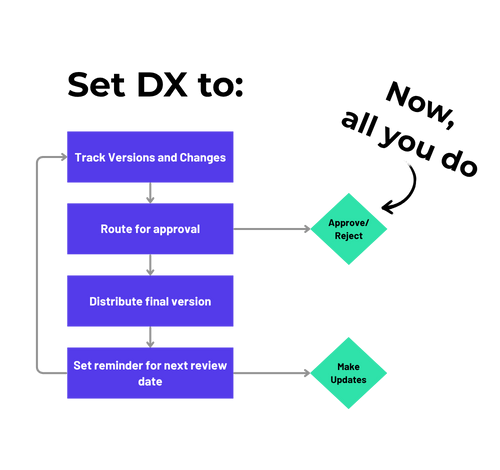Keep your policies current, compliant, and acknowledged with automated policy management. This step-by-step guide shows how, with DocuXplorer, you can standardize processes and automate SOPs across your organization.

Policies shape how an organization operates. They help guide decisions, set expectations, and protect employees, customers, and the business itself. Unfortunately, policy management can be slow, fragmented, and overly dependent on manual oversight.
Aligning day-to-day operations with policies and standard operating procedures (SOPs) is possible only when these policies are current, organized, and accessible. When drafts get stuck in data silos or policy acknowledgments are inefficiently tracked, they can’t be put into practice.
Also, when it’s unclear who owns which part of the process, and staff don’t trust that policies are accurate or up to date, your organization exposes itself to compliance gaps, inconsistent practices, and confusion that can affect workplace culture.
Investing in automated policy management acts like operational insurance: it safeguards your organization from avoidable errors by ensuring policies are consistently created, approved, communicated, and maintained.
A document management system builds structure and accountability into every stage of the policy and procedure lifecycle. It keeps work moving, protects version integrity, and gives your employees access to the information they need so they’re not left wondering about best practices.
Before shifting to SOP automation, evaluate how policies and procedures are currently treated in your organization:
Look for bottlenecks like lost drafts, outdated versions in circulation, unclear approval paths, or missed review dates. These are prime opportunities for automation to create immediate impact.
Here’s a typical policy and procedure workflow and how you can transform it with DocuXplorer:

Before: Policies and procedures are drafted ad hoc or by copying past versions that may no longer be compliant. Multiple versions circulate through email, making the document's status unclear. Feedback is done in person or through lengthy message threads, approvals lag, and there is no documented audit trail.
With DocuXplorer: Standardized templates let you build policies and SOPs quickly and correctly from the start. Drafts automatically route to the right reviewers (HR, Legal, IT, Compliance) with tracked revisions. Once approved, the final version is automatically filed in the proper folder, with full history retained.
Before: Your team shares policy updates by email or a shared drive. Acknowledgments are tracked manually through spreadsheets (or not at all). Following up requires reminders and guesswork.
With DocuXplorer: Relevant stakeholders get automated notifications when a new or updated policy or SOP is available. They can view and digitally acknowledge procedural changes in one place. Automated reminders reduce chasing, and real-time reports help managers confirm acknowledgment, streamlining audits and proving compliance.
Before: Policy and procedure reviews depend on memory or calendar notes. Outdated policies go unnoticed. Manual routing leads to missed reviews, unclear ownership, and compliance gaps.
With DocuXplorer: You’ll set the system to flag policies and related SOPs approaching review or expiry and assigns them to the correct owner. Teams collaborate on updates directly within the DMS, preserving version history. Once approved, the new version replaces the old one with a record of when and why changes were made.
Before: Issues or incidents trigger your team to make updates reactively, but documentation is inconsistent. Lessons learned don’t always make it into revised policies.
With DocuXplorer: You’ll review, adjust, approve, and redistribute policies and SOPs to staff quickly and easily with just a few clicks. Your policies will evolve with your actual needs and remain relevant and actionable.
Before: Policies and SOPs are stored in shared drives, personal folders, or filing cabinets. Tracking which version is current is difficult, and locating the right procedure for training, audits, or onboarding takes time away from other work.
With DocuXplorer: Your documents live in a single, secure location with role-based access. Staff can locate files instantly by title, topic, department, date, or metadata tags. AI-powered chat makes retrieval and analysis simple, even during time-sensitive audits. Companies that maintain an intranet or employee portal can easily publish or push finalized policies from DocuXplorer to those platforms, ensuring employees always see the most current, approved versions.
Once your DMS takes over the repetitive, administrative burden, policy and procedure workflows become consistent, transparent, and low-effort. You’ll eliminate:
With DocuXplorer, policy and SOP automation is effortless. You’ll keep every SOP accurate, accessible, and audit-ready across the organization—so your team can focus on applying them, not managing them.